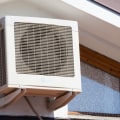As the summer months bring rising temperatures, homeowners often search for effective ways to keep their homes cooler and reduce energy costs. One solution that has gained attention for its efficiency and simplicity is the use of attic fans. These fans are designed to regulate the temperature in your attic by ventilating hot air and allowing cooler air to circulate, which can make a noticeable difference in the overall comfort and energy efficiency of your home. While attic fans are not a complete substitute for air conditioning, they serve as an excellent complementary tool to reduce heat buildup and lower cooling costs, particularly during the peak of summer.
How Attic Fans Work to Combat Heat
Attic fans function by drawing hot air out of the attic space and replacing it with cooler air from outside. During the summer, attics can become extremely hot, with temperatures often reaching 120 degrees Fahrenheit or more. This trapped heat radiates down into living spaces, increasing the workload on air conditioning systems and making it harder to maintain a comfortable indoor environment. By ventilating the attic, these fans reduce the amount of heat transfer to the rest of the house, resulting in a cooler home and more efficient air conditioning performance.
The benefits of attic fans extend beyond temperature control. They also help protect the structural integrity of your home. Excessive heat and humidity in the attic can lead to problems like warped roofing materials, damaged insulation, and even mold growth. Proper ventilation provided by an attic fan can prevent these issues by maintaining balanced temperatures and reducing moisture levels. For homeowners concerned about the longevity of their roof and other structural components, attic fans offer an additional layer of protection.
Energy Efficiency and Cost Savings
One of the most significant advantages of attic fans is their ability to improve energy efficiency. By reducing the temperature in the attic, they lessen the burden on air conditioning systems, which translates into lower energy consumption and reduced utility bills. While the initial investment in an attic fan may vary depending on the type and size of the unit, many homeowners find that the energy savings quickly offset the installation costs.
Additionally, attic fans can be equipped with advanced features such as thermostats and humidity sensors, which allow them to operate only when needed. This ensures that the fan runs efficiently without wasting energy. Solar-powered attic fans are another popular option for those looking to maximize energy savings while reducing their carbon footprint.
Choosing the Right Attic Fan for Your Home
When considering an attic fan, it is essential to choose a model that suits the size of your attic and the specific needs of your home. Factors such as the square footage of the attic, local climate conditions, and the type of roofing materials can all influence the effectiveness of the fan. Consulting with a professional can help ensure that the fan is properly sized and installed for optimal performance. Experts in home improvement and roofing, such as CMW Roofing, Siding, & Gutters - North Haven, CT, can provide valuable insights into the best attic fan solutions for your home and ensure proper installation that integrates seamlessly with your existing roof system.
Proper installation is crucial for attic fans to function effectively. Improper placement or inadequate ventilation pathways can limit the fan's ability to draw out hot air, negating its benefits. For example, ensuring that there are sufficient intake vents to allow cooler air to flow into the attic is essential for maintaining balanced ventilation. A professional installation not only ensures efficiency but also minimizes the risk of roof damage or water leaks caused by poorly sealed fan units.
The Limitations of Attic Fans
While attic fans offer numerous benefits, it is important to understand their limitations. These fans work best in homes where the attic space is adequately ventilated and insulated. If the attic lacks sufficient insulation, the fan may struggle to offset the heat transfer into living spaces effectively. Additionally, attic fans are not designed to cool the entire house; rather, they focus on reducing attic temperatures to alleviate heat buildup.
Homeowners should also be cautious about over-relying on attic fans in extremely hot or humid climates. In such cases, the energy savings may be less significant, and a more comprehensive cooling strategy, including proper insulation and efficient air conditioning, may be required to maintain comfort.
Conclusion
Attic fans can be a valuable addition to any home, particularly during the hot summer months when reducing heat buildup is a priority. By ventilating the attic and lowering temperatures, these fans help improve energy efficiency, reduce utility bills, and protect the structural integrity of your home. While they may not replace the need for air conditioning, they complement cooling systems effectively, making them a practical choice for homeowners looking to enhance their home’s comfort and efficiency. With professional guidance from companies you can ensure that your attic fan is properly installed and tailored to your home’s needs, allowing you to enjoy the full benefits of this simple yet effective solution.



